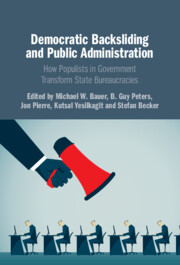 Democratic Backsliding and Public Administration
Democratic Backsliding and Public Administration Book contents
- Democratic Backsliding and Public Administration
- Democratic Backsliding and Public Administration
- Copyright page
- Contents
- Figures
- Tables
- Contributors
- Preface
- 1 Introduction: Populists, Democratic Backsliding, and Public Administration
- 2 Incomplete Democratization, System Transformation, and the Civil Service: A Case Study on the Weimar Republic and the Nazi Regime in Germany
- 3 Resilience Without Resistance: Public Administration Under Mutating Populisms in Office in Italy
- 4 Illiberal Transformation of Government Bureaucracy in a Fragile Democracy: The Case of Hungary
- 5 Public Administration in Poland in the Times of Populist Drift
- 6 Technocratic-Populist Mayors and Public Administration in Three European Cities
- 7 Populism and the Deep State: The Attack on Public Service Under Trump
- 8 “Doublespeak Populism” and Public Administration: The Case of Mexico
- 9 Venezuela: Sidelining Public Administration Under a Revolutionary-Populist Regime
- 10 Working, Shirking, and Sabotage in Times of Democratic Backsliding: An Experimental Study in Brazil
- 11 Public Administration: How to Respond to Populism and Democratic Backsliding
- 12 Conclusions: Public Administration Under the Rule of Democratic Backsliders
- References
- Index
2 - Incomplete Democratization, System Transformation, and the Civil Service: A Case Study on the Weimar Republic and the Nazi Regime in Germany
Published online by Cambridge University Press: 17 August 2021
- Democratic Backsliding and Public Administration
- Democratic Backsliding and Public Administration
- Copyright page
- Contents
- Figures
- Tables
- Contributors
- Preface
- 1 Introduction: Populists, Democratic Backsliding, and Public Administration
- 2 Incomplete Democratization, System Transformation, and the Civil Service: A Case Study on the Weimar Republic and the Nazi Regime in Germany
- 3 Resilience Without Resistance: Public Administration Under Mutating Populisms in Office in Italy
- 4 Illiberal Transformation of Government Bureaucracy in a Fragile Democracy: The Case of Hungary
- 5 Public Administration in Poland in the Times of Populist Drift
- 6 Technocratic-Populist Mayors and Public Administration in Three European Cities
- 7 Populism and the Deep State: The Attack on Public Service Under Trump
- 8 “Doublespeak Populism” and Public Administration: The Case of Mexico
- 9 Venezuela: Sidelining Public Administration Under a Revolutionary-Populist Regime
- 10 Working, Shirking, and Sabotage in Times of Democratic Backsliding: An Experimental Study in Brazil
- 11 Public Administration: How to Respond to Populism and Democratic Backsliding
- 12 Conclusions: Public Administration Under the Rule of Democratic Backsliders
- References
- Index
Summary
Based on a case study on Germany in the first half of the twentieth century, this chapter addresses the administrative dimension of liberal-democratic backsliding by examining the role the state bureaucracy played in the process of system transformation from the Weimar Republic to the Nazi regime. It shows how the state bureaucracy in Germany was approached and transformed by illiberal politicians in the late Weimar Republic and under Hitler. Despite the existence of a professional Weberian bureaucracy with strong regulative barriers against politicization in the Weimar Republic, the civil service did not function as a safeguard of the democratic system. Instead, many civil servants welcomed the roll-back of democratic principles, which facilitated the radical transformation and politicization of the bureaucracy in a short time. This case study underlines the significance of institutionalizing democratic values in the civil service in processes of democratization in order to strengthen its resilience to attempts of eroding liberal democratic institutions.
Keywords
- Type
- Chapter
- Information
- Democratic Backsliding and Public AdministrationHow Populists in Government Transform State Bureaucracies, pp. 22 - 46Publisher: Cambridge University PressPrint publication year: 2021
- 3
- Cited by


